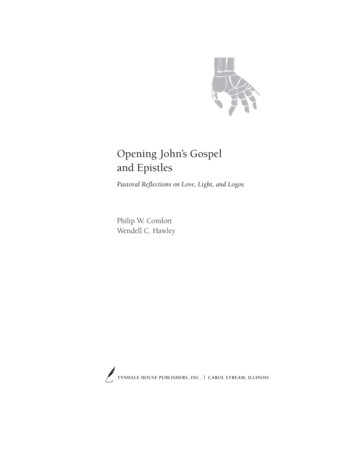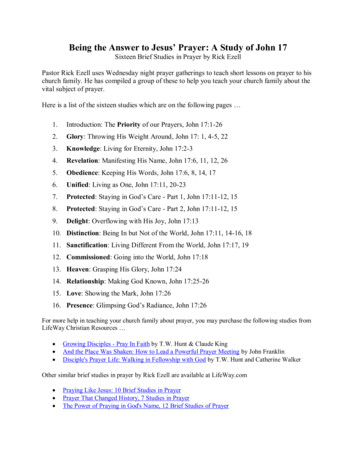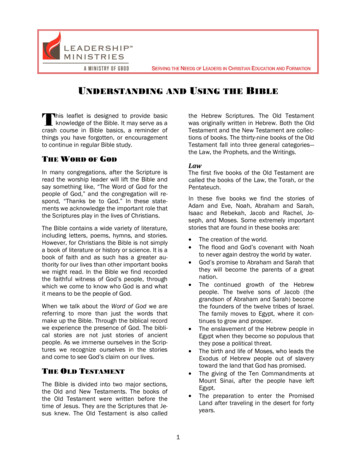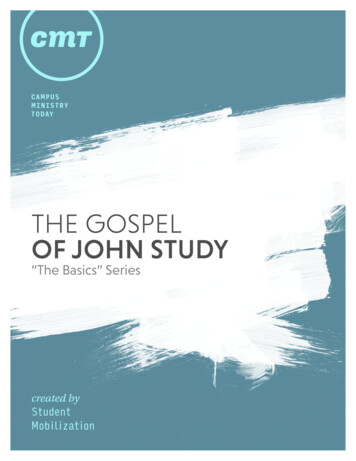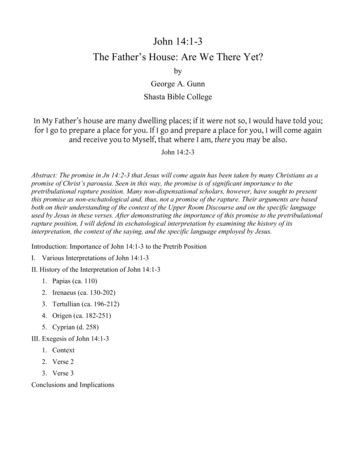
Transcription
John 14:1-3The Father’s House: Are We There Yet?byGeorge A. GunnShasta Bible CollegeIn My Father’s house are many dwelling places; if it were not so, I would have told you;for I go to prepare a place for you. If I go and prepare a place for you, I will come againand receive you to Myself, that where I am, there you may be also.John 14:2-3Abstract: The promise in Jn 14:2-3 that Jesus will come again has been taken by many Christians as apromise of Christ’s parousia. Seen in this way, the promise is of significant importance to thepretribulational rapture position. Many non-dispensational scholars, however, have sought to presentthis promise as non-eschatological and, thus, not a promise of the rapture. Their arguments are basedboth on their understanding of the context of the Upper Room Discourse and on the specific languageused by Jesus in these verses. After demonstrating the importance of this promise to the pretribulationalrapture position, I will defend its eschatological interpretation by examining the history of itsinterpretation, the context of the saying, and the specific language employed by Jesus.Introduction: Importance of John 14:1-3 to the Pretrib PositionI. Various Interpretations of John 14:1-3II. History of the Interpretation of John 14:1-31. Papias (ca. 110)2. Irenaeus (ca. 130-202)3. Tertullian (ca. 196-212)4. Origen (ca. 182-251)5. Cyprian (d. 258)III. Exegesis of John 14:1-31. Context2. Verse 23. Verse 3Conclusions and Implications
John 14:1-3 “The Father’s House: Are We There Yet?”G. Gunn, p. 2Introduction: Importance of John 14:1-3 to the Pretrib PositionThe rapture, though alluded to frequently in the New Testament, is really only described in detail in3 passages: John 14:1-3; 1 Corinthians 15:51-54; and 1 Thessalonians 4:13-18. One could possibly addPhilippians 3:20-21, but the reference is less specific there. Each of these passages contributesinformation about the event, and, taken together, we have a fairly complete description of the event.However, the information from all 3 passages is required in order to piece together a complete picture ofthe rapture. The event takes place in five distinct movements:1. The Lord Jesus, along with the spirits of those believers who have died during the church age,descends from heaven to earth’s atmosphere.2. The bodies of believers who have died during the church age are resurrected.3. Believers who are alive at the time of the rapture are changed to receive glorified bodies.4. Together, resurrected bodies of dead saints and changed living believers are caught up to theLord in the atmosphere.5. The assembled company of all believers from the entire church age, along with the Lord,accompanies the Lord on His journey from the atmosphere to His next venue.You’ll notice that I have worded the fifth movement in such a way that it could fit the description ofeither a pretribulational rapture, posttribulational rapture, or other rapture-timing option relative to thetribulation. Essentially, anyone who actually believes in a rapture could agree with this five-movementdescription. What really divides the pretribulational position from the posttribulational position is thequestion of the “next venue” for the Lord following the rapture. The two positions, with their fivemovements, can be presented diagrammatically as follows:
John 14:1-3 “The Father’s House: Are We There Yet?”G. Gunn, p. 3Pretribulational Rapture:Heaven (the Father’s House)1543Tribulation PeriodMessianic Kingdom2Posttribulational Rapture:Heaven14Tribulation Period325Messianic Kingdom
John 14:1-3 “The Father’s House: Are We There Yet?”G. Gunn, p. 4Thus, though we often think of the difference between the pretribulational position and theposttribulational position as being one of timing, it might also be conceived as a difference in venue.Posttribulationist Robert Gundry recognized the importance of venue to the pretribulation position whenhe stated, “ no passage concerning the rapture incorporates a return to heaven.”1 As we shall see, tosupport his position, Gundry reinterprets John 14:1-3 so as to make it a non-eschatological promise. It isbecause of this issue of venue that John 14:1-3 is so crucial to the pretribulational position. I mustdisagree with E. Schuyler English when he says that, “ while the promise of John 14:3 is the first NewTestament intimation of the Rapture, it cannot be said to be descriptive of it.”2 Indeed, as we shall see,John 14:1-3 contains specific, detailed and vital information descriptive of the rapture. The importanceof John 14:1-3 for the pretribulation position is further seen in a recent statement by Lutheran theologianBarbara Rossing:“I call it [dispensationalism] a theological racket,” says Barbara Rossing, an edge in her voice. TheLutheran theologian has little patience for dispensationalism. The basis cited for its concept of theRapture is just as summarily dealt with. “If you look closely at that passage [1 Thess 4:13-18], Jesusis descending from heaven,” Rossing says. “Yes, to be sure, Paul says people will be snatched up inthe air to meet Jesus, but it never says that Jesus turns around, switches direction and goes back upto heaven for seven years. They have to insert that. They have to make that up because it’s not in thetext.”3Rossing, of course, was restricting her comments solely to 1 Thessalonians 4:13-18, as if that werethe only passage dealing with the rapture. If that were the only passage describing the rapture, she wouldbe correct. In fact, with the exception of John 14, no major rapture passage (1 Cor 15:51-54; Phil 3:20-1Robert H. Gundry, The Church and the Tribulation (Grand Rapids: Zondervan, 1973) 153.2E. Schuyler English, Re-Thinking the Rapture (Traveler’s Rest, South Carolina: Southern Bible Book Store, 1954) 28.3Rick Kennedy, Dallas Observer 02-09-2006. Emphasis mine.
John 14:1-3 “The Father’s House: Are We There Yet?”G. Gunn, p. 521; 1 Thess 4:13-18) explicitly mentions the return to heaven.4 Only John 14 specifically describes thereturn to heaven as the final venue of the rapture event.Those who hold to a pretribulational rapture tend to agree that John 14:1-3 describes the rapture.Those who do not hold to the pretribulational position generally fall into two broad categories: (1) John14:1-3 describes the rapture but it is not pretribulational (i.e., it is either posttribulational or coincidentwith either an amillennial or postmillennial parousia), and (2) John 14:1-3 describes a noneschatological coming of Christ (i.e. post-resurrection, post-ascension, or some other “coming” event).If the promise of John 14:1-3 can be shown to be an eschatological coming, I believe the issue of venueforces us to the pretribulational position. The most crucial issues, then, that must be settled are:1. Is the promise eschatological or non-eschatological?52. What venue is described by the “Father’s house,” “mansions,” and the “place prepared” by Jesus.Therefore, it is with this reminder of the importance of John 14:1-3 for the pretribulational position,that we focus our attention on this fascinating passage of Scripture.I. Various Interpretations of John 14:1-3When it comes to John 14:1-3, the challenge confronting the interpreter of Scripture is daunting. Inthe short span of three verses, differing views by major commentators on the meaning of four different4By inference, the necessity for the Judgment Seat of Christ before the Marriage Supper of the Lamb would seem to require areturn to heaven, as would some other arguments based on inference. However, John 14 is the only clear Scriptural referenceto a specific return to heaven at the rapture.5Note: In using the term “eschatological” I am referring to events that are future to our own time. Some theologians hold to aposition that has come to be referred to as “realized eschatology” in which the first coming of Jesus is seen as bringing in theeschaton, and hence we are presently in eschatological times. I am not using the term “eschatological” in the same sense thata realized eschatology theologian would.
John 14:1-3 “The Father’s House: Are We There Yet?”G. Gunn, p. 6expressions yield no less than seventeen different interpretations! Following is a brief survey of theseinterpretations: Believe believe (πιστεύετε πιστεύετε, pisteuete pisteuete), verse 1The verb occurs twice in this verse, the form being identical for both. Both occurrences could beeither indicative or imperative. This gives the possibility of four different interpretations. Though thedifferences are noted by most commentaries, they have little bearing on the actual meaning of thisverse, at least as it pertains to our discussion of the rapture.1. Two Indicatives. “You believe in God; you also believe in me.”2. Indicative Followed By Imperative. “You believe in God; believe also in me.”3. Imperative Followed By Indicative. “Believe in God; indeed, you believe in me.”4. Two Imperatives. “Believe in God; believe also in me.” My Father’s House (τῇ οἰκίᾳ τοῦ πατρός μου, tei oikia tou patros mou), verse 2This precise phrase does not occur elsewhere in John, though a very similar one occurs one othertime in John, where it is a reference to the temple in Jerusalem (2:16). Luke 2:49 is perhaps a similarreference to the temple, but it lacks the word “house” (either οἴκος, oikos or οἰκία oikia). Luke 16:27and Acts 7:20, the only other similar NT references, refer to earthly houses of human fathers. Thishas given rise to at least three interpretations for the phrase in John 14:2.5. Heaven.“Jesus was leaving to prepare a place for them in heaven, the Father’s house.6“My Father’s house” clearly refers to heaven.”76John F. Walvoord and Roy B. Zuck, The Bible Knowledge Commentary: An Exposition of the Scriptures (Wheaton, IL:Victor Books, 1983). 2:322.
John 14:1-3 “The Father’s House: Are We There Yet?”G. Gunn, p. 76. Both Heaven and Earth.“Very attractive is the view that ‘my Father’s house’ includes earth as well as heaven, sothat wherever we are we are in that house.”87. The Body of Christ As The New Temple.“The same expression, ‘Father’s house,’ appears in 2:16, in which it is clear that the templein Jerusalem was the Father’s house. Yet in the next few verses (2:17-21) Jesus likenedhimself to a temple, a temple that would be destroyed and raised again in three days. TheSon, through the process of crucifixion and resurrection, would become the temple, theFather’s house, prepared to receive the believers. He, as the temple, the Father’s house,would be the means through which the believers could come to dwell in the Father and theFather in them.”9 Dwelling Places (μοναὶ, monai), verse 2This noun occurs only one other time in all the New Testament (John 14:23) where it is areference to Jesus and the Father’s coming to make their dwelling with the believer during thechurch age. Two interpretations have been given for this.8. Dwelling Places in Heaven.“The phrase [‘many mansions’] means that there is room to spare for all the redeemed inheaven”107Leon Morris, The Gospel According to John (NICNT) (Grand Rapids: Wm. B. Eerdman’s, 1971), 638.8Morris, 638, f.n. 5.9Philip W. Comfort and Wendell C. Hawley, Opening the Gospel of John (Wheaton: Tyndale House Publishers, 1994) 229.See also Craig S. Keener, The IVP Bible Background Commentary: New Testament (Downers Grove, Ill.: InterVarsity Press,1993) Jn 14:2.10Morris, 638-39.
John 14:1-3 “The Father’s House: Are We There Yet?”G. Gunn, p. 89. The Believer As God’s Dwelling Place“John presumably means this language figuratively for being in Christ, where God’spresence dwells (2:21); the only other place in the New Testament where this term for“dwelling places” or “rooms” occurs is in 14:23, where it refers to the believer as God’sdwelling place (cf. also the verb “dwell”—15:4–7).”11 I will come again (πάλιν ἔρχομαι, palin erchomai), verse 3Many of the preceding interpretive choices ultimately depend on, or determine, how oneinterprets this phrase. Because the verb occurs in the present tense, some have been reluctant to takethis as predictive of a future event. Others, while admitting that the present is “predictive” areunwilling to make it predictive of a distant future event.“The Greek here is in the present tense and should properly be translated ‘I am coming,’ showingthe immediacy of the Lord’s return. His coming to them again would be realized in a shortwhile.”12Thus, at least eight different interpretations have been posited: 1310. Christ’s Return From Death at The Resurrection and the Post-Resurrection Appearances.“ the going away and coming again, according to the context of John 14-16, would be butfor ‘a little while’ (see 14:19-20; 16:16-23), not two or more millennia! Indeed 14:20 and16:20-22 make it evident that ‘that day’ would be the day of Christ’s resurrection, the day inwhich the disciples would realize that they had become united to the risen Christ . When11Keener.12Comfort and Hawley, 230.13B. F. Westcott, The Gospel According to St. John Introduction and Notes on the Authorized Version, ed. B. F. Westcott &A. Westcott (London: J. Murray, 1908) 201.
John 14:1-3 “The Father’s House: Are We There Yet?”G. Gunn, p. 9Jesus said, ‘I am coming again,’ that ‘coming again’ occurred on the day of his resurrection(see Dodds).”1411. Christ’s Coming on the Day of Pentecost in the Person of the Holy Spirit to Bring Believers intothe Body of Christ.“In this context, John probably means not the Second Coming but Christ’s return after theresurrection to bestow the Spirit (14:16–18). In Jewish teaching, both the resurrection of thedead (which Jesus inaugurated) and bestowal of the Spirit indicate the arrival of the new ageof the kingdom.”15“This coming refers, therefore, to the return of Jesus through the Holy Spirit, to the closeand indissoluble union formed thereby between the disciple and the glorified person ofJesus; comp. all that follows in vv. 17, 19-21, 23; especially ver. 18, which is the explanationof our: I come again.”1612. Christ’s Coming to the Believer at Death to Receive Him to Heaven.“This verse is much used by pre-tribulationists to support the theory that when Christ returnsit will be not to establish His earthly kingdom, but to take His disciples from earth to heavenseven years before the kingdom. John 14:3, however, is ‘variously interpreted’; and the verydoubtfulness of its application has caused some recent defenders of the dispensationalistviewpoint deliberately to omit it from their argument. The interpretation that seems the mostplausible contextually is that at a believer’s death, ‘I come and will receive you unto myself’14Comfort and Hawley, 222, 230.15Keener, Jn 14:3.16Frederic Louis Godet, Commentary on John’s Gospel (Grand Rapids: Kregel, 1978; reprint of 1886 ed.) 830.
John 14:1-3 “The Father’s House: Are We There Yet?”G. Gunn, p. 10in glory The immediate context suggests nothing about the visible second advent but ratheruses ‘I come’ in a spiritual sense (v. 18).”1713. Christ’s Coming for the Church at the Pretribulational Rapture.“I will come back refers here, not to the Resurrection or to a believer’s death, but to theRapture of the church when Christ will return for His sheep (cf. 1 Thes. 4:13-18) and theywill be with Him (cf. John 17:24).”1814. Christ’s Coming in Power and Glory at the Posttribulational Parousia.“Furthermore, only two days following the Olivet Discourse, Jesus talked about the[posttribulational] rapture in the Upper Room (John 14:1-3).”1915. Christ’s Coming at the Last Great Judgment.“This return must not be understood as referring to the Holy Spirit, as if Christ hadmanifested to the disciples some new presence of himself by the Spirit. It is unquestionablytrue, that Christ dwells with us and in us by his Spirit; but here he speaks of the last day ofjudgment, when he will, at length, come to assemble his followers.”2016. Christ’s Coming to the Believer at Individual Salvation.2117J. Barton Payne, The Imminent Appearing of Christ, (Grand Rapids: Wm. B. Eerdmans, 1962) 74. See also AugustusHopkins Strong, Systematic Theology (Bellingham, Wa.: Logos Research Systems, Inc., 2004) 1003; Kenneth Gentry, TheBeast of Revelation (Tyler, TX: Institute for Christian Economics, 1989), pp. 25-26. This view is also shared, according toGodet (p. 830), by Grotius, Reuss, Lange, Hengstenberg, and Keil.18Walvoord and Zuck 2:322.19Gundry, 134. Although in other places Gundry seems to prefer seeing this as a non-eschatological promise.20John Calvin, Calvin’s Commentaries, Vol XVIII “John 12-21; Acts 1-13” (Grand Rapids: Zondervan) 83.21Many commentators make reference to this view, but I have been unable to obtain a quote from someone who actuallyholds the position.
John 14:1-3 “The Father’s House: Are We There Yet?”G. Gunn, p. 1117. Christ’s Ever Coming into the World and to the Church as the Risen Lord.“But though the words refer to the last ‘coming’ of Christ, the promise must not be limited tothat one ‘coming’ which is the consummation of all ‘comings.’ Nor again must it be confinedto the ‘coming’ to the Church on the day of Pentecost, or to the ‘coming’ to the individualeither at conversion or at death, though these ‘comings’ are included in the thought. Christ isin fact from the moment of His Resurrection ever coming to the world and to the Church, andto men as the Risen Lord (comp. 1:9).”22II. History of the Interpretation of John 14:1-3Everyone likes to appeal to the early church fathers when their views are in agreement with them!As pretribulation rapturists, we have not had the most pleasant experience in this realm of exegesis. Dueto the lack of corroboration for a pretribulational rapture from the early church fathers, some have castaspersion on our view of the rapture. In reply, we have argued that patristic interpretation is notnecessarily a sure guide to correct theology. The early fathers were clearly wrong on a number of issues(e.g. baptismal regeneration, allegorical hermeneutics, the value of asceticism, etc.).23 Nevertheless, theywere also right on a number of issues, due to the fact that oral transmission of traditional interpretationwas still only a generation or two removed from the apostles. At the very least, it would be interesting tosee whether the early Christian writers understood John 14:1-3 as being eschatological and the “Father’s2223Westcott, 201.By the way, I believe there is a perfectly good reason why many of the ante-nicene fathers seem to support a posttribrapture. I believe they reasoned, based on their experience, that the imperial Roman persecution they were facing must surelyhave been the eschatological rise of antichristian Rome in the tribulation period. Believing they were in the tribulation period,they obviously could not believe in a pretribulation rapture! We might be tempted to think the same thing, were we to havegone through that horrible experience. This is a perfectly good example of the kind of eisegesis that results from interpretingScripture based on one’s experience. We, too, must exercise great caution in interpreting Biblical prophecy based on geopolitical conditions we observe in the world.
John 14:1-3 “The Father’s House: Are We There Yet?”G. Gunn, p. 12house” as a reference to heaven. If the apostles had understood the reference to be both eschatologicaland heavenly, then we would expect the early fathers to reflect this understanding. In fact, we do findthat the extant writings of the early fathers viewed this passage as having an eschatological orientationand the “Father’s house” as a reference to heaven. At least five ante-nicene fathers make reference toJohn 14:1-3 in their writings.1. Papias (ca. 110) – Exposition of the Oracles of the Lord, IV, Preserved in Irenaeus AgainstHeresies who makes mention of these fragments of Papias as the only works written by him, inthe following words: “Now testimony is borne to these things in writing by Papias, an ancientman, who was a hearer of John, and a friend of Polycarp, in the fourth of his books; for fivebooks were composed by him.” Papias understood the promise of John 14:1-3 as aneschatological coming to take believers to heaven in conjunction with their judgment of rewards:“As the presbyters say, then those who are deemed worthy of an abode in heaven shall go there,others shall enjoy the delights of Paradise, and others shall possess the splendor of the city; foreverywhere the Savior will be seen, according as they shall be worthy who see Him. But thatthere is this distinction between the habitation of those who produce an hundredfold, and that ofthose who produce sixty-fold, and that of those who produce thirty-fold; for the first will betaken up into the heavens, the second class will dwell in Paradise, and the last will inhabit thecity; and that on this account the Lord said, ‘In my Father's house are many mansions:’ for allthings belong to God, who supplies all with a suitable dwelling-place, even as His word says,that a share is given to all by the Father, according as each one is or shall be worthy. And this isthe couch in which they shall recline who feast, being invited to the wedding.”
John 14:1-3 “The Father’s House: Are We There Yet?”G. Gunn, p. 132. Irenaeus (ca. 130-202) – Against Heresies, Book III, Ch. XIX.3 – Irenaeus describes the futureday of the Christian’s resurrection as a day when the believer will be caught up to the mansionsin the Father’s house in heaven:“Wherefore also the Lord Himself gave us a sign, in the depth below, and in the height above,which man did not ask for, because he never expected that a virgin could conceive, or that it waspossible that one remaining a virgin could bring forth a son, and that what was thus born shouldbe ‘God with us,’ and descend to those things which are of the earth beneath, seeking the sheepwhich had perished, which was indeed His own peculiar handiwork, and ascend to the heightabove, offering and commending to His Father that human nature (hominem) which had beenfound, making in His own person the first-fruits of the resurrection of man; that, as the Head rosefrom the dead, so also the remaining part of the body–[namely, the body] of every man who isfound in life–when the time is fulfilled of that condemnation which existed by reason ofdisobedience, may arise, blended together and strengthened through means of joints and bandsby the increase of God, each of the members having its own proper and fit position in the body.For there are many mansions in the Father's house, inasmuch as there are also many members inthe body.”3. Tertullian (ca. 196-212)a. On the Resurrection of the Flesh, XLI – Tertullian sees in John 14:1-3 an eschatologicalcoming at the time of the resurrection to take believers to heaven.“‘For we know;’ he [Paul] says, ‘that if our earthly house of this tabernacle were dissolved,we have a house not made with hands, eternal in the heavens;’ in other words, owing to thefact that our flesh is undergoing dissolution through its sufferings, we shall be provided witha home in heaven. He remembered the award (which the Lord assigns) in the Gospel:
John 14:1-3 “The Father’s House: Are We There Yet?”G. Gunn, p. 14‘Blessed are they who are persecuted for righteousness’ sake, for theirs is the kingdom ofheaven.’ Yet, when he thus contrasted the recompense of the reward, he did not deny theflesh’s restoration; since the recompense is due to the same substance to which thedissolution is attributed, - that is, of course, the flesh. Because, however, he had called theflesh a house, he wished elegantly to use the same term in his comparison of the ultimatereward; promising to the very house, which undergoes dissolution through suffering, a betterhouse through the resurrection. Just as the Lord also promises us many mansions as of ahouse in His Father's home.”b. Scorpiace, Antidote for the Scorpion’s Sting, Ch. VI – In a passage describing the rewardsthat await the Christian martyr, Tertullian likens the martyr to an athlete who endures painand suffering in order to win the prize. The awarding of that prize takes place in the future inthe Father’s house:“Suits for injuries lie outside the racecourse. But to the extent that those persons deal indiscoloration, and gore, and swellings, he will design for them crowns, doubtless, and glory,and a present, political privileges, contributions by the citizens, images, statues, and–of suchsort as the world can give–an eternity of fame, a resurrection by being kept in remembrance.The pugilist himself does not complain of feeling pain, for he wishes it; the crown closes thewounds, the palm hides the blood: he is excited more by victory than by injury. Will youcount this man hurt whom you see happy? But not even the vanquished himself will reproachthe superintendent of the contest for his misfortune. Shall it be unbecoming in God to bringforth kinds of skill and rules of His own into public view, into this open ground of the world,to be seen by men, and angels, and all powers? – to test flesh and spirit as to steadfastnessand endurance? – to give to this one the palm, to this one distinction, to that one the privilegeof citizenship, to that one pay? – to reject some also, and after punishing to remove them
John 14:1-3 “The Father’s House: Are We There Yet?”G. Gunn, p. 15with disgrace? You dictate to God, forsooth, the times, or the ways, or the places in which toinstitute a trial concerning His own troop (of competitors) as if it were not proper for theJudge to pronounce the preliminary decision also. Well now, if He had put forth faith tosuffer martyrdoms not for the contest's sake, but for its own benefit, ought it not to have hadsome store of hope, for the increase of which it might restrain desire of its own, and check itswish in order that it might strive to mount up, seeing they also who discharge earthlyfunctions are eager for promotion? Or how will there be many mansions in our Father'shouse, if not to accord with a diversity of deserts?”c. On Monogamy, Ch. X – In this passage the “many mansions” and the “house of the Father” are clearly references to heaven where we will one day receive our reward after ourresurrection:“But if we believe the resurrection of the dead, of course we shall be bound to them withwhom we are destined to rise, to render an account the one of the other. But if in that agethey will neither marry nor be given in marriage, but will be equal to angels, is not the factthat there will be no restitution of the conjugal relation a reason why we shall not be bound toour departed consorts? Nay, but the more shall we be bound (to them), because we aredestined to a better estate–destined (as we are) to rise to a spiritual consortship, to recognizeas well our own selves as them who are ours. Else how shall we sing thanks to God toeternity, if there shall remain in us no sense and memory of this debt; if we shall be reformedin substance, not in consciousness? Consequently, we who shall be with God shall betogether; since we shall all be with the one God–albeit the wages be various, albeit there be‘many mansions’, in the house of the same Father having labored for the ‘one penny’ of theself-same hire, that is, of eternal life; in which (eternal life) God will still less separate themwhom He has conjoined, than in this lesser life He forbids them to be separated.”
John 14:1-3 “The Father’s House: Are We There Yet?”G. Gunn, p. 164. Origen (ca. 182-251)a. Commentary on the Gospel of John. Tenth Book. 28 – Though known for his allegoricalinterpretations, Origen did sometimes interpret literally. He appears to have done so here,interpreting the Father’s house and the many mansions in terms of the eschatological feast inthe kingdom of heaven:“Now, those who believe in Him are those who walk in the straight and narrow way, whichleads to life, and which is found by few. It may well be, however, that many of those whobelieve in His name will sit down with Abraham and Isaac and Jacob in the kingdom ofheaven, the Father's house, in which are many mansions.”b. De Principiis. Ch. XI On Counter Problems. 6 – Here, Origen’s view of what becomes of thesoul after death may seem a bit strange. Nevertheless, he clearly sees the “Father’s house” asa reference to heaven and the “mansions” as other-worldly spheres leading to the Father’sHouse.“I think, therefore, that all the saints who depart from this life will remain in some placesituated on the earth, which holy Scripture calls paradise, as in some place of instruction,and, so to speak, class-room or school of souls, in which they are to be instructed regardingall the things which they had seen on earth, and are to receive also some informationrespecting things that are to follow in the future, as even when in this life they had obtainedin some degree indications of future events, although ‘through a glass darkly,’ all of whichare revealed more clearly and distinctly to the saints in their proper time and place. If any oneindeed be pure in heart, and holy in mind, and more practiced in perception, he will, bymaking more rapid progress, quickly ascend to a place in the air, and reach the kingdom ofheaven, through those mansions, so to speak, in the various places which the Greeks have
John 14:1-3 “The Father’s House: Are We There Yet?”G. Gunn, p. 17termed spheres, i.e., globes, but which holy Scripture has called heavens; in each of which hewill first see clearly what is done there, and in the second place, will discover the reason whythings are so done: and thus he will in order pass through all gradations, following Him whohas passed into the heavens, Jesus the Son of God, who said, ‘I will that where I am, thesemay be also.’ And of this diversity of places He speaks, when He says, ‘In My Father's houseare many mansions.’”5. Cyprian (d. 258) – Treatise II, On the Dress of Virgins. 23. Though we would probably disagreewith
has given rise to at least three interpretations for the phrase in John 14:2. 5. Heaven. "Jesus was leaving to prepare a place for them in heaven, the Father's house.6 "My Father's house" clearly refers to heaven."7 6John F. Walvoord and Roy B. Zuck, The Bible Knowledge Commentary: An Exposition of the Scriptures (Wheaton, IL:




